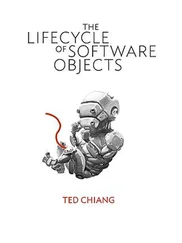Many worried that their choices were rendered meaningless because every action they took was counterbalanced by a branch in which they had made the opposite choice. Experts tried to explain that human decision-making was a classical rather than quantum phenomenon, so the act of making a choice didn’t by itself cause new branches to split; it was quantum phenomena that generated new branches, and your choices in those branches were as meaningful as they ever were. Despite such efforts, many people became convinced that prisms nullified the moral weight of their actions.
Few acted so rashly as to commit murder or other felonies; the consequences of your actions still fell on you in this branch, not any other. But there was a shift in behavior that, while falling short of a mass outbreak of criminality, was readily discernible by social scientists. Edgar Allan Poe had used the phrase “the imp of the perverse” to describe the temptation to do the wrong thing simply because you could, and for many people the imp had become more persuasive.
· · ·
Not for the first time, Nat wished there were some way to tell how Lyle felt about his prism, some visible gauge of her progress. A month had gone by since her gambit of announcing she had given up her prism, and while she knew Lyle was closer to giving his up than when she started, she had no way of telling how much longer it would be. Another month? Another six months? Morrow’s patience would run out soon, and then they’d have to try something more drastic.
Once everyone was seated, Lyle volunteered to go first. He turned to Dana. “When I first started attending this group, you said one of the goals was to have a healthy relationship with your paraself.”
“One of the possible goals, yes,” said Dana.
“The other day I was talking to this guy who goes to the same gym I go to, and he seems to have that. He says he and his paraself are friends, they exchange tips that they’ve learned, they encourage each other to do better. It sounded amazing.”
Nat was immediately alert. Was Lyle resolving to make that his goal? That would be a disaster. If he was set on that, even Morrow’s plan wouldn’t be enough to get him to sell his prism.
“And I realized that I will never, ever have that kind of relationship with my paraself. So I’ve decided that I’m going to get rid of my prism.”
Nat was so relieved that for a moment she thought it must have been obvious to the others, but no one noticed. Zareenah asked Lyle, “Did you talk it over with your paraself?”
“Yeah. At first he suggested we just take a break for a while but still hang on to our prisms. I had thought about doing that before, because then I could show him when things were going better for me. But a couple meetings back, Nat mentioned that she didn’t need to prove anything to anyone. I think that keeping my prism would just keep me in that mind-set, wanting to prove something. So I told my paraself that, and he understood. We’re going to sell our prisms.”
Kevin said, “Just because your relationship with your paraself isn’t perfect doesn’t mean you have to give it up. That’s like saying if your marriage isn’t fairy-tale happy all the time, you don’t want to be married at all.”
“I don’t think it’s like that,” said Zareenah. “Maintaining your marriage is a lot more important than maintaining your relationship with your paraself. Everyone got by just fine before prisms were invented.”
“But is getting rid of your prism going to be what everyone in this group is expected to do? First Nat, now you. I don’t know if I want to give up my prism.”
“Don’t worry, Kevin,” said Dana. “You get to choose what your goal is. Not everyone has to have the same one.”
The group spent some more time reassuring Kevin and discussing the validity of different ways of living with prisms. When the meeting was over, Nat went to talk to Lyle. “I think you’re making the right decision,” she told him.
“Thanks, Nat. You definitely helped me make it.”
“I’m glad.” Now came the crucial part. Nat was surprised by how nervous she felt. As casually as she could, she said, “You know what, you should sell your prism at the same place I sold mine. They’ll give you and your paraself a good price.”
“Really? What’s it called?”
“SelfTalk, on Fourth Street.”
“Oh yeah, I think I saw a flyer of theirs around here.”
“Yeah, that’s where I got their name, too. If you want some moral support when you sell it, I can go with you, and afterward we can go get coffee or something.”
Lyle nodded. “Sure, let’s do that.”
And just like that, the plan was right on track. “How about Sunday?” she said.
· · ·
Nat was waiting outside of SelfTalk for Lyle to arrive. She knew there was a chance he had changed his mind, but he showed up right on time and had the prism with him. It was a little anticlimactic to finally see it; here was what she and Morrow had been working toward for months, but it didn’t look any different from any other late-model prism, just a blue aluminum briefcase. Nat was suddenly struck by how the situation was both extraordinary and surprisingly mundane: each prism was like something out of a fairy tale, a bag containing a door to another world, and yet most of those worlds weren’t particularly interesting, most of those doors weren’t especially valuable. It was only because this one might reunite a prince with his beloved that it was precious.
“Still ready to do this?” she asked.
“One hundred percent,” said Lyle. “I checked with my paraself this morning, and he’s still on board. He should be at his version of SelfTalk right now.”
“Great. Let’s go.”
They went inside, and Morrow was at the counter. “Can I help you?” he asked.
Lyle took a deep breath. “I’d like to sell this prism.”
Morrow did the usual, checking the keyboard, the video camera, the microphone. This was the biggest variable in their plan: they couldn’t be sure who was working the counter on the other side of the prism, who was going to make parallel Lyle an offer. It was very likely parallel Morrow or parallel Nat, in which case things would be fine; even though they had no idea what the plan was, they would follow this Morrow’s lead. But there was always the chance that someone else was working the counter at SelfTalk in the other branch, which might make things complicated.
Nat saw that Morrow kept typing longer than the hardware check would require, which was a good sign. Morrow was telling the person on the other end to trust him, to pay parallel Lyle more than market price for the prism and act as if it were perfectly normal, that he would explain later. Fortunately Lyle had no idea of how long a prism inspection usually took.
Morrow made his offer, and then Lyle briefly conferred with his paraself. Since they had already agreed to sell their prisms, they weren’t talking about the price; just a final farewell. Nat made sure not to exchange looks with Morrow while they waited, but she wasn’t sure where she ought to look. It didn’t make sense to stare at Lyle, so she just looked out the front window.
Finally Lyle handed the prism over and took his payment. Once it was done, Nat asked him, “How do you feel?”
“Kind of sad, kind of relieved.”
“Let’s go get some coffee.”
They chatted for a while at the coffee shop. Afterward they hugged goodbye, and she told him she’d see him at the next meeting. Her plan was to attend one more meeting and then announce that she felt like she didn’t need to go to the meetings anymore.
When she got back to SelfTalk, it was a half hour before closing time, and there were only a couple of customers left in the store. She found Morrow in his office, typing on Lyle’s prism. “You’re just in time,” he said. “I’m on with my paraself.” He gestured for her to look at the screen as he typed.
Читать дальше









